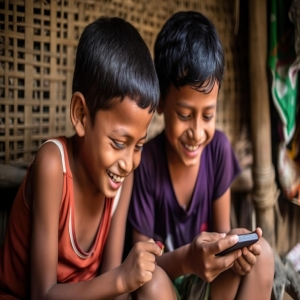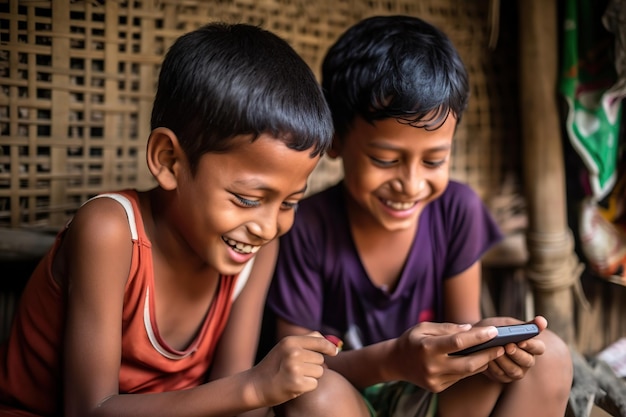
.jpg) Adv Jessy Kurian
Adv Jessy Kurian

The pandemic has indeed increased tech knowledge, as it made children spend more time online. Technology can have both positive and negative effects on children. Tech can enhance learning and understanding and help children build confidence. It can make learning more engaging and personalised. Interactive apps and educational platforms support education by providing instant feedback, adapting to each child's learning pace, and offering a diverse range of subjects to explore, from traditional academic subjects like reading and math to less frequently emphasised subjects like vocational training or the arts.
Beyond supplementing traditional subjects, tech can significantly develop a child's brain in unique ways. For example, gaming apps focused on problem-solving and strategy. These can be especially beneficial for preschool-age children in the critical stage of honing their general visual and motor skills. Tech can boost children's creativity. Children are naturally creative, and tech is a powerful catalyst that can transform and encourage creativity into something truly extraordinary. It can build technical and problem-solving skills. It is not just about learning how to use a device but about developing a range of competencies that go beyond the basics. For instance, by using portable devices like a smartwatch, children don't just learn to tell time; they also learn how to navigate through apps, understand touch-screen mechanics, and even develop problem-solving skills when troubleshooting issues.
It is also true that tech can facilitate social interaction and bring people together. Video calls on mobile devices, multiplayer online games, and even social media platforms provide the opportunity for interpersonal interactions with friends and family even when they cannot be physically present.
Unfortunately, this vibe has also made children exposed to harm via social media. Children are clueless and confused about right and wrong on social media. Sometimes, their social media communication/association goes to the extent that they are trapped in trafficking and sex rackets, etc.
Excessive use of technology can lead to mental health issues like low creativity, lack of attention, and delays in social and emotional development. It can also cause sleep disturbances. Which can lead to stress, mood swings and depression. Children who overuse technology may be more likely to be obese, physically inactive and have musculoskeletal problems. Children may spend less time interacting with others and more time on their devices. Cyberbullying is another negative impact, which can have severe consequences on children's mental health. A study reveals that too much screen time can delay speech development in babies and toddlers.
I often hear the term "New Gen and Gen Z culture" in my busy professional schedule. However, just recently, I got an opportunity to witness the said reality by living with children. I spent about 20 days in Kerala. Except for two legal matters in the Court, I spent those days with kids, and they were under 17 years of age. They depict a culture very different from the one I am used to. The thrill of coming together, talking together, enjoying together, eating together, enjoying the same conversation, enjoying the same food, etc, is fast fading. These kids are in a very different world altogether. They find contentment in their smartphones. They are found in the corners of the house, in their study rooms or bedrooms. Their fingers are always on the move on their mobiles. They go to bed very late as their eyes are glued to their mobiles. They are not found at breakfast, lunch or supper as they claim that they need their own space. They are not seen when a guest asks about the kids.
Their vocabulary is entirely different. I was surprised when a little boy in the first standard addressed a 50-year-old neighbour, "Hi Guy! How are you?" His fingers continued tapping his mobile screen while he sat on the chair when that neighbour paid his family a courtesy visit. Though my feelings escalated, the man seemed unbothered as he had adapted to such a culture. He was also facing the same at home. They address you as 'guy' as they see it on YouTube or social media. They adopt the vocabulary they see in social media. They are blissfully unaware of the traditional local language or the terms used in their native tongue. Their language is that of YouTubers, serial actors, cinema actors, or mobile game players.
Their food culture is also of the world of Gen Z. They are not interested in the traditional local food culture. They need fast, modern food. Most of them prefer online food. They do not understand the family's finances or other difficulties as they have no time to listen to elders' conversations. But in fact, they are well conversant with the financial position of America, war among the countries, the G-20 Summit, etc, as these matters are at their fingertip.
Their prayer culture is also different. They expect everything to be as fast as fast food. They are more interested in short prayers than long traditional prayers at home because they want to switch to channels or mobiles as quickly as possible. In this scenario, the question is whether it is necessary to check children's use of mobiles.
The Australian Prime Minister, Anthony Albanese, says there should be a social media ban until age 16. Is it possible? A total ban may look seductive. Can the parents guide their kids in this regard? In India, digital literacy is quite low. There are many different languages, and platforms don't always cater the same way in all these languages, and there is also a lot of shared device usage. Therefore, a blanket policy may be impossible. Amanda, a Professorial Research Fellow in Digital Social and Cultural Research at the Institute for Culture and Society and Co-Director of the Young and Resilient Research Centre at Western Sydney University, says they have conducted a survey of 10000 children in Tier 2 and Tier 3 cities and in government schools in Delhi and found out that 80% of children helped their parents navigate online platforms. So, to expect parents to guide children on safe online usage is not sensible.
However, we must ensure the safety of children online. In India, we have a law, the Digital Personal Data Protection (DPDP) Act, 2023, to safeguard children's personal data under the age of 18. The Act mandates that entities processing children's data must ensure they have the verifiable consent of a parent or a legal guardian. But its implementation makes it a toothless tiger.
In conclusion, (1) The education system should strike a balance between going tech and also emphasis on physical sports. In the curriculum, children should be taught how to be resilient online. Educational institutions should give tech education to children from class one and even before. (2) Educational institutions can also educate the parents through seminars and classes that will enable them to check on their kids to this effect and also to protect themselves (3) The parents should monitor the websites children visit, ensure children watch high-quality educational content, see that kids use digital media with fewer interactive features and more supportive multimedia features. (4) Parents should monitor the screen time the kids spend (5) Parents can research apps before purchasing the mobile and choose age-appropriate apps with clear learning goals. However, the teacher's role in educating children in online activities cannot be ruled out.